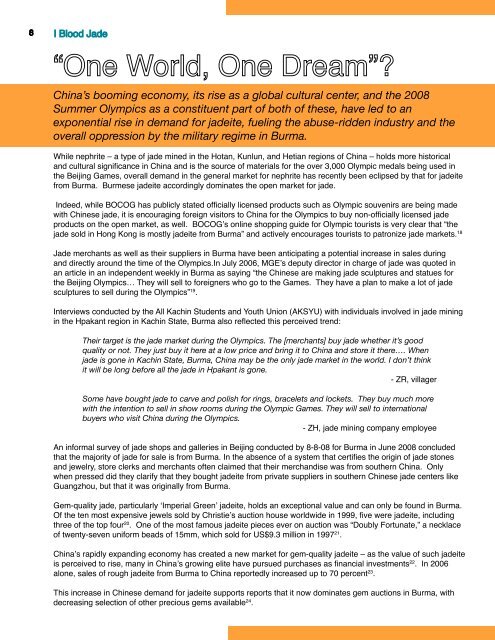Create successful ePaper yourself
Turn your PDF publications into a flip-book with our unique Google optimized e-Paper software.
China’s booming economy, its rise as a global cultural center, and the 2008Summer Olympics as a constituent part of both of these, have led to anexponential rise in demand for jadeite, fueling the abuse-ridden industry and theoverall oppression by the military regime in Burma.While nephrite – a type of jade mined in the Hotan, Kunlun, and Hetian regions of China – holds more historicaland cultural significance in China and is the source of materials for the over 3,000 Olympic medals being used inthe Beijing Games, overall demand in the general market for nephrite has recently been eclipsed by that for jadeitefrom Burma. Burmese jadeite accordingly dominates the open market for jade.Indeed, while BOCOG has publicly stated officially licensed products such as Olympic souvenirs are being madewith Chinese jade, it is encouraging foreign visitors to China for the Olympics to buy non-officially licensed jadeproducts on the open market, as well. BOCOG’s online shopping guide for Olympic tourists is very clear that “thejade sold in Hong Kong is mostly jadeite from Burma” and actively encourages tourists to patronize jade markets. 18<strong>Jade</strong> merchants as well as their suppliers in Burma have been anticipating a potential increase in sales duringand directly around the time of the Olympics.In July 2006, MGE’s deputy director in charge of jade was quoted inan article in an independent weekly in Burma as saying “the Chinese are making jade sculptures and statues forthe Beijing Olympics… They will sell to foreigners who go to the Games. They have a plan to make a lot of jadesculptures to sell during the Olympics” 19 .Interviews conducted by the All Kachin Students and Youth Union (AKSYU) with individuals involved in jade miningin the Hpakant region in Kachin State, Burma also reflected this perceived trend:Their target is the jade market during the Olympics. The [merchants] buy jade whether it’s goodquality or not. They just buy it here at a low price and bring it to China and store it there…. Whenjade is gone in Kachin State, Burma, China may be the only jade market in the world. I don’t thinkit will be long before all the jade in Hpakant is gone.- ZR, villager(Burma Press Summary (from Working People’s Daily - 13 February 1990), Vol IV, No 2, February 1990“Myanmar fetches 23 mln dlrs from gem sale”, Xinhua, 24 March 2003“Mid-Year Gems Emporium fetches over 15.2m euro”, New Light of Myanmar, 23 October 2003Pala International, “Special Report: Burma Gem Sales and Statistics”, 16 July 2008, Pala Internationalwebsite (http://www.palagems.com/gem_news_burma_stats.htm), viewed on 23 July 2008“Almost 70 percent of gems sell at Myanmar auction: report”, Agence France Presse, 17 October 2005“Myanmar wraps up million dollar gem sale”, Agence France Presse, 21 March 2007“MGE says jade sale biggest ever”, Myanmar Times, Vol 19, No 376, 23 - 29 July 2007“Mid-year Empo sells 3618 gem, jade, pearl lots”, New Light of Myanmar, 27 November 2007)Chinese merchants made up 90 percent of the foreign merchants and 55 percent of overall attendance at the MGEauction in November 2007, in line with a consistent trend over the past several years in attendance at the auctionsin Rangoon 25 .Some have bought jade to carve and polish for rings, bracelets and lockets. They buy much morewith the intention to sell in show rooms during the Olympic Games. They will sell to internationalbuyers who visit China during the Olympics.- ZH, jade mining company employeeAn informal survey of jade shops and galleries in Beijing conducted by 8-8-08 for Burma in June 2008 concludedthat the majority of jade for sale is from Burma. In the absence of a system that certifies the origin of jade stonesand jewelry, store clerks and merchants often claimed that their merchandise was from southern China. Onlywhen pressed did they clarify that they bought jadeite from private suppliers in southern Chinese jade centers likeGuangzhou, but that it was originally from Burma.Gem-quality jade, particularly ‘Imperial Green’ jadeite, holds an exceptional value and can only be found in Burma.Of the ten most expensive jewels sold by Christie’s auction house worldwide in 1999, five were jadeite, includingthree of the top four 20 . One of the most famous jadeite pieces ever on auction was “Doubly Fortunate,” a necklaceof twenty-seven uniform beads of 15mm, which sold for US$9.3 million in 1997 21 .China’s rapidly expanding economy has created a new market for gem-quality jadeite – as the value of such jadeiteis perceived to rise, many in China’s growing elite have pursued purchases as financial investments 22 . In 2006alone, sales of rough jadeite from Burma to China reportedly increased up to 70 percent 23 .This increase in Chinese demand for jadeite supports reports that it now dominates gem auctions in Burma, withdecreasing selection of other precious gems available 24 .“Myanmar wraps up gem auction amid boycott calls: report”, Agence France Presse, 27 November 2007“Mid-year Empo sells 3618 gem, jade, pearl lots”, New Light of Myanmar, 27 November 2007Since 2001, but especially following last year’s crackdown on monk-led protests in Burma, international civilsociety groups – including prominent jewelers and jewelry associations – have promoted boycotts and sanctionson Burmese gemstones. The Tom Lantos Block Burmese JADE Act was signed into law in the United Stateson July 30, 2008, closing a loophole on preexisting sanctions on Burmese gemstones to include value-addedBurmese gemstones imported to the United States via third countries like Thailand. Canada imposed a ban onall imports of products of Burmese origin in December 2007 and the EU specifically bans Burmese gemstones 26 .Thus, westerners seeking to acquire Burmese jadeite will likely have to travel to China and other jade-tradingnations like Thailand. However, without a global call for consumers in China – including foreign independenttravelers, tour groups, and even visitors staying in ‘Olympic Homestays’ organized by the Beijing Municipal TourismAdministration 27 – to boycott jadeite, many are bound to become unwitting supporters of Burma’s military regimeand the widespread and systematic abuses upon which Burma’s jadeite industry relies.


